Tooth sensitivity is a common condition today, mainly caused by the habit of eating acidic or cold foods along with improper oral hygiene. However, when you encounter this condition, you should not worry too much but apply the following home remedies for tooth sensitivity if you cannot go to the dentist immediately.
1. Causes of tooth sensitivity
Tooth sensitivity or sensitive teeth is a common condition caused by worn enamel or irritated nerves in the dentin. There are many causes of tooth sensitivity, including:
1.1. Tooth decay
Tooth decay is one of the common causes of tooth sensitivity. Tooth decay erodes the dentin, even exposing the pulp, causing the patient to feel pain. In some severe cases, it can also cause pulpitis, leading to an increased risk of abscesses and severe infections.
1.2. After dental procedures
Dental procedures such as scaling, teeth whitening, crowns, and braces can cause sensitivity for about 4-6 weeks. During this time, if the patient knows how to properly care for their teeth according to the doctor’s instructions, the unpleasant symptoms will gradually decrease and stop completely. If the instructions are not followed, this condition may become more severe.
1.3. Damage to the tooth structure
When the tooth is chipped, the enamel is worn, or the tooth neck is worn, exposing the dentin layer. When exposed to acids in saliva, food, or unwanted external influences, the dentin is susceptible to sensitivity and pain.
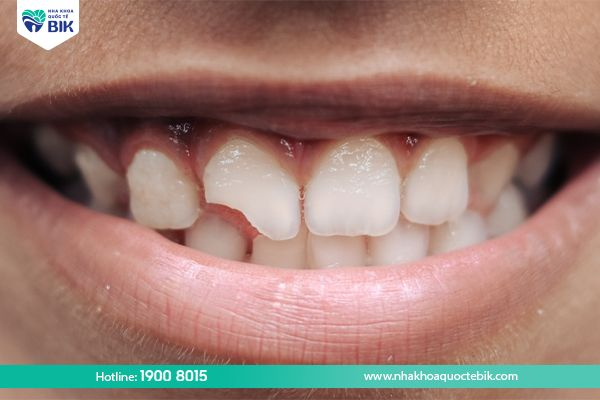
1.4. Improper oral care
Improper oral care such as using too much force when brushing teeth, highly abrasive toothpaste, toothbrushes that are too hard, etc. can all cause tooth enamel to wear away, causing pain and sensitivity.
1.5. Due to receding gums
Plaque accumulated on teeth, if not treated immediately, can over time cause receding gums and expose the tooth root. At this time, the exposed dentin will be exposed to impacts such as acids in food, sudden hot and cold temperatures, bacteria that attack again, etc.
1.6. Due to the use of acidic foods
Using acidic foods is also one of the causes of tooth sensitivity. Food groups containing a lot of acid such as sour foods, carbonated drinks, etc. can erode the enamel, expose the dentin and make the teeth more sensitive.

1.7. Due to bad habits
Bad habits such as grinding teeth while sleeping, regularly eating too hard food, drinking too cold water,… if occurring continuously for a long time can damage the tooth structure, causing tooth sensitivity.
2. Consequences of tooth sensitivity
Tooth sensitivity is one of the warning signs of oral health problems. If not promptly treated, it will cause the following consequences:
– Eating is not delicious due to tooth pain and tooth sensitivity. Over time, the patient will feel loss of appetite, skip meals, making their health increasingly weak.
– Tooth sensitivity occurs suddenly at any time, even when sleeping. This makes the patient sleep poorly, restlessly, and mentally tired and stressed.
– In addition, if tooth sensitivity is a sign of oral diseases, it will cause unpredictable complications. Bacteria will attack, causing teeth to be damaged, weakened, loose, and even permanently lost.

3. How to treat tooth sensitivity at home
In case the patient cannot go to a dental facility for treatment, they can refer to simple ways to treat tooth sensitivity at home such as:
3.1. How to treat tooth sensitivity with green tea
Green tea has long been known to have many health benefits thanks to its anti-inflammatory properties, cancer prevention, and good for cardiovascular and oral health. You can use green tea water as a mouthwash twice a day to strengthen teeth and reduce inflammation.

3.2. How to treat tooth sensitivity with honey and warm water
Honey is one of the natural ingredients that has antibacterial properties, helps speed up wound healing as well as reduce pain, swelling and inflammation. You can rinse your mouth with a honey solution diluted with warm water about 1-2 times a day, and the pain will gradually subside.
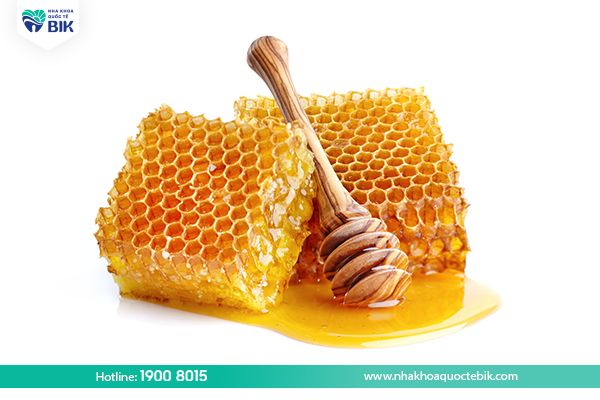
3.3. How to treat tooth sensitivity with toothpaste
According to oral health experts, toothpaste is one of the effective methods in protecting the nerves under the teeth, reducing tooth sensitivity and pain.
In addition, toothpaste also contains ingredients such as potassium nitrate, which has the effect of blocking pain signals transmitted from the nerves in the teeth to the brain, making the patient feel less sensitive. You should choose herbal toothpaste or toothpaste for sensitive teeth twice a day to reduce sensitivity.
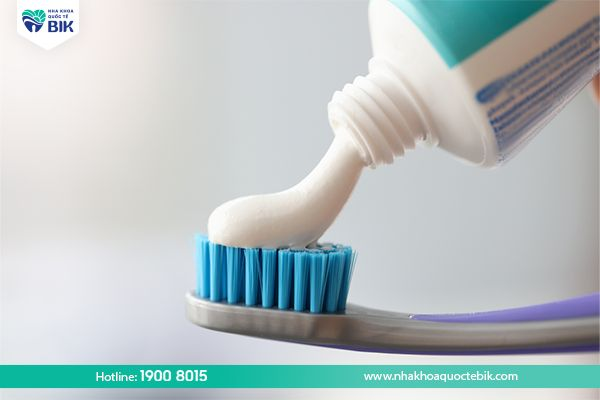
3.4. How to treat tooth sensitivity with guava leaves
Guava leaves are extremely effective in treating oral diseases, especially tooth sensitivity and toothache. Take young guava leaves, wash them, drain them, then pound the dried guava leaves with salt and add a moderate amount of water to rinse your mouth. You should rinse your mouth 2 to 3 times a day, about 10 minutes each time to reduce tooth sensitivity.
3.5. Tips for treating toothache with turmeric
Turmeric has long been known for its ability to fade dark scars and also has anti-inflammatory effects and contains curcumin to help relieve pain. To effectively reduce toothache with turmeric, you can mix turmeric powder with water and rub it on your gums for 1 to 2 minutes. Then rinse your mouth thoroughly with water.
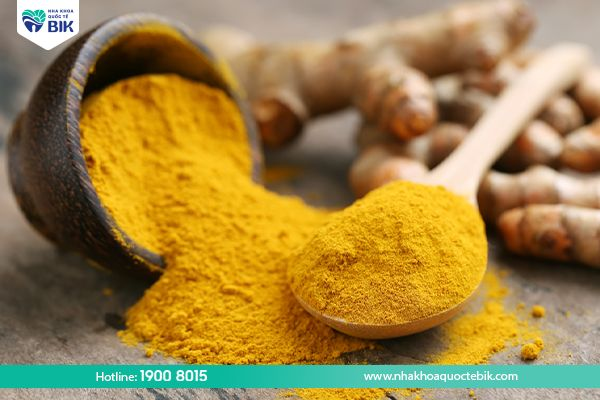
3.6. Tips for treating toothache with garlic
Garlic contains many natural antibiotics, so it has effective antibacterial and anti-inflammatory effects. Therefore, garlic is used by many people to reduce toothache. Peel the garlic and crush it with a little salt, then apply the mixture to the sensitive tooth for about 10 minutes. This method can be applied many times during the day to reduce tooth sensitivity.
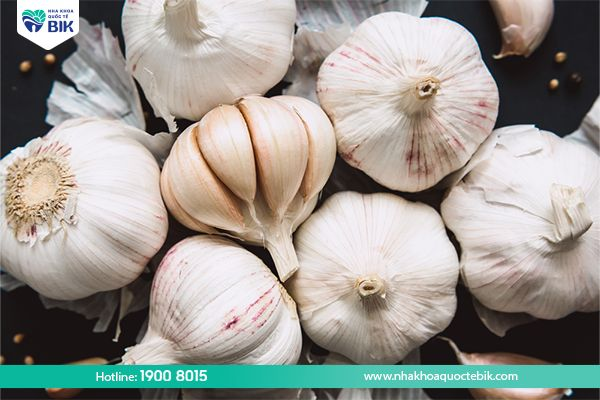
3.7. Tips to treat tooth sensitivity with betel leaves
Betel leaves are also one of the ingredients used by many people to treat tooth sensitivity. The essential oil from betel leaves has the ability to inhibit many types of harmful bacteria. First, you need to wash the betel leaves thoroughly and crush them with a little salt. Then, add alcohol to the mortar mixture and use the water to rinse your mouth. You can rinse your mouth 2 to 3 times a day, each time for about 10 minutes to reduce tooth sensitivity.
3.8. Tips to treat tooth sensitivity with coconut oil
Sesame oil or coconut oil is also an effective tip to treat tooth sensitivity at home. In addition, rinsing with sesame oil or coconut oil can also reduce the symptoms of gingivitis. Take a spoonful of coconut oil and rinse your mouth for 1 to 2 minutes, do it 2 to 3 times a week to see the effect.
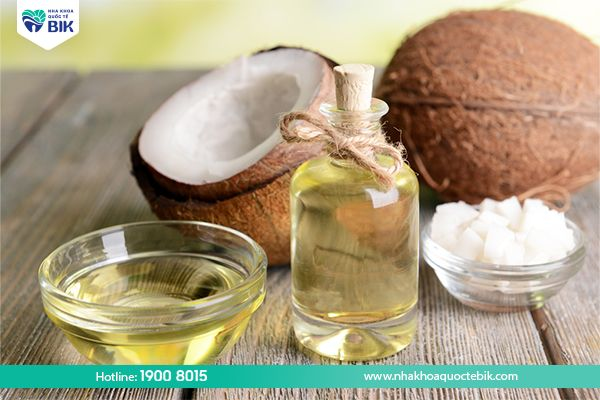
3.9. Tips to treat tooth sensitivity with Hydrogen Peroxide
Hydrogen can help reduce tooth sensitivity effectively. Dilute hydrogen peroxide with water in a 1:1 ratio, then rinse your mouth with ¼ cup of water. Finally, rinse your mouth with clean water. Note that you should not swallow the hydrogen peroxide solution. Do this 2 to 3 times a week and you will see your teeth become whiter and less sensitive.
So tooth sensitivity is a condition that causes discomfort and annoyance to the patient, and can even cause the body to become weak and tired. Therefore, when you cannot go to a dental facility immediately, you can apply the above methods to reduce tooth sensitivity at home. However, if you see that the sensitivity does not improve, you should go to the dentist for examination. BIK International Dental Clinic with a team of highly qualified doctors and rich experience will be a reliable treatment place that you can choose.


















